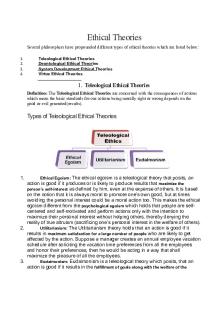Are Zoos Ethical? PDF

| Title | Are Zoos Ethical? |
|---|---|
| Author | Faith Cavalier |
| Course | Introduction to Philosophy |
| Institution | University of Southern Mississippi |
| Pages | 3 |
| File Size | 48.9 KB |
| File Type | |
| Total Downloads | 69 |
| Total Views | 154 |
Summary
This is an essay prompt given to us by Professor Michael Dearmey for our final exam....
Description
1 Cavalier Faith Cavalier Intro to Philosophy Michael Dearmey 11/17/18 Are Zoos Ethical? Zoos have been around for ages, even when they weren’t acknowledged as zoos. Going back to early time, we see that Romans and even the French had zoos, though they were not called this. According to Dale Jamieson, “these ancient collections were not exhibited in public parks, or they were maintained for purposes other than recreation or education.” The animals in these exhibits were mostly used for games. Most cities had an arena in which they would slaughter these animals for entertainment. These arenas lasted until the eight centuries. So, even back in these ages, animals were still used as game, a term we still use now when we “hunt” for deer, hog, and even some exotic animals such as giraffes, lions, and tigers. In his essay, Jamieson uses four arguments for zoos that are commonly used: amusement, education, opportunities for scientific research, and help in preserving species. In this essay, I will be giving my take on these four arguments and informing you on why I do not believe zoos are ethical. First, I will talk about entertainment. Zoos are commonly known as a center for entertainment for families, couples, and school trips. Many zoos use the animals for different performances, such as riding camels, jumping dolphins, or talking gorillas. Most people view all of these as extremely entertaining, but why? A lot of these animals go through rigorous training and borderline abuse to achieve the acts we see in zoos. Would humans enjoy being locked up and trained for hours on end just to do an act for animals? Probably not. However, it does
2 Cavalier become a moral question of whether we owe animals basic compassion or not. Most people would probably say no, because animals cannot communicate the way we can, but I disagree. I believe animals should be able to live where they are most comfortable, just like you or me. To me, this argument does not make a valid argument as to why zoos must exist. This brings me to the next argument which is that zoos can be used for educational purposes. This argument has been around since the beginning of zoos. Although some zoos can be very educational, most do not put in the effort to educate their guests on the animals they are seeing. Even if they were, most zoo-goers do not take the time to read about these animals or get to know them better. Zoo-goers simply want to see these animals, knowing they can not actually touch them or that the animals can not harm them at all. As Jamieson says in his essay, “In the case of others the problem is an apathetic and unappreciative public.” There are not many people who want to learn about the animals they are seeing, which relates back to the first argument. Zoo-goers are not interested in the educational aspect of seeing these captive animals; they are interested in the entertainment. Once again, educational does not hit the mark for me in the argument of zoos. Thirdly, we have the argument of scientific research. While scientific research is always important to understanding how the world works around us, is it important enough to hold these animals in unknown environments for their whole entire life? Also, because they are in an unknown territory, they probably are not acting the way they usually do. I have read many articles that provide insight to the way animals act when they are in distress, and many animals in zoos exhibit these characteristics. Some of these characteristics include hair pulling, regurgitation, and reingestation. All of these characteristics are way less likely to appear if an
3 Cavalier animal were in its normal habitat. So how could a scientist get correct animal data if animals are being subject to anxiety and depression from being stuck behind a glass wall and constantly stared at by humans? Another argument, disbanded. The final argument used in Jamieson’s essay is that zoos preserve species that would eventually become extinct. In this essay, Jamieson explores how breeding programs at zoos have been less helpful than one might think. Although they have saved some species, others are dying at infant age due to lack of genetic diversity during breeding. How can a zookeeper not realize this? One could say they are less focused on keeping animals safe, and more focused on constantly generating out more entertainment, no matter what species we’re losing or producing too much of. Breeding programs are slowly but surely making it to where these animals, such as the Mountain Gorilla, Dale Jamieson notes, are only able to survive in a zoo. Is it really moral to take a wild animal are breed it until it’s only way of life is between 4 glass walls? No, not to me. Yet another argument I refuse to get on board with. Animals have been held captive and under humans for a long time. That does not make it ethical, however. Although these animals lack communication skills, they still deserve to be in their natural habitat with their family. By putting them up in zoos, they can become distressed, depressed, and anxious. Humans constantly overlook these signs because we are too focused on getting entertainment for a few hours. If we could look past our own greedy needs, maybe we would realize that animals too deserve to live out their natural life. We don’t need to use our power to constantly generate unsafe places for animals....
Similar Free PDFs

Are Zoos Ethical?
- 3 Pages

How (Un)ethical Are You
- 9 Pages

Jamieson, Dale - Against Zoos
- 28 Pages

Q9 ZOOS Essay PLAN - ROUGH PLAN
- 2 Pages

Ethical theories
- 6 Pages

Ethical breakdown
- 9 Pages

Am is are - Apuntes Am, is ,are
- 2 Pages

Ethical Leadership Task 1
- 9 Pages

C206 Ethical-Task 1
- 7 Pages

Business Ethical Scandals
- 4 Pages

Applying Ethical Principles
- 6 Pages

Ethical Practice Briefing Paper
- 4 Pages

Ethical Dilemmasin Healthcare
- 7 Pages

Ethical Decision Making
- 5 Pages
Popular Institutions
- Tinajero National High School - Annex
- Politeknik Caltex Riau
- Yokohama City University
- SGT University
- University of Al-Qadisiyah
- Divine Word College of Vigan
- Techniek College Rotterdam
- Universidade de Santiago
- Universiti Teknologi MARA Cawangan Johor Kampus Pasir Gudang
- Poltekkes Kemenkes Yogyakarta
- Baguio City National High School
- Colegio san marcos
- preparatoria uno
- Centro de Bachillerato Tecnológico Industrial y de Servicios No. 107
- Dalian Maritime University
- Quang Trung Secondary School
- Colegio Tecnológico en Informática
- Corporación Regional de Educación Superior
- Grupo CEDVA
- Dar Al Uloom University
- Centro de Estudios Preuniversitarios de la Universidad Nacional de Ingeniería
- 上智大学
- Aakash International School, Nuna Majara
- San Felipe Neri Catholic School
- Kang Chiao International School - New Taipei City
- Misamis Occidental National High School
- Institución Educativa Escuela Normal Juan Ladrilleros
- Kolehiyo ng Pantukan
- Batanes State College
- Instituto Continental
- Sekolah Menengah Kejuruan Kesehatan Kaltara (Tarakan)
- Colegio de La Inmaculada Concepcion - Cebu

